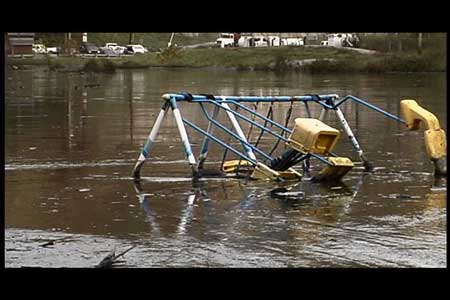This post is co-written by Bruce Nilles, director of the Sierra Club National Coal Campaign, and Lyndsay Moseley, associate Washington representative for the National Coal Campaign.
Yesterday the Sierra Club will put the Tennessee Valley Authority (TVA) on notice for its negligence surrounding the tragic December 22 coal ash spill at the Kingston Fossil Plant in Roane County, Tennessee. In collaboration with more than a dozen neighbors whose property was directly affected by the spill, along with a coalition of other environmental organizations, we are requesting that a federal court oversee the cleanup and remediation and that the responsible parties compensate local residents.
On December 22, 2008, an earthen dam for a coal ash waste impoundment failed at the Kingston Fossil Plant, releasing a billion gallons of coal ash sludge and contaminated water into the Emory and Clinch Rivers and onto more than 300 acres around the community of Harriman.
We have Sierra Club members, staffers and volunteers living in this area and who grew up near Harriman – and we’ve also had some of our staff visit the spill site (including today’s blog co-writer Lyndsay Moseley). The feedback we’re getting from the people there is heart-breaking.
We’ve seen overwhelming sadness at the loss of their homes and their peaceful way of life. They are concerned about the health threats, and said that, with a few exceptions, they’d received very little information about the real threats from the coal sludge around their homes.
The residents say they are getting mixed signals. The TVA has issued delayed warnings on the health effects of the ash sludge, and cleanup workers are wearing hazardous material suits. The TVA is also telling people the water is fine, but the news reported that the schools will be preparing lunches with bottled water and the schools are encouraging parents to send bottled water with their kids.
On December 27, Appalachian Voices sampled several of the spill’s piles and found elevated levels of toxins, including arsenic and lead. Most of this potentially toxic waste remains in or near those waters – both contaminating water and becoming airborne dust once it dries.
The Emory and Clinch rivers are tributaries of the Tennessee River – which is the source of drinking water for the Kingston, Chattanooga, and other communities downstream. This poses a substantial health risk to persons who consume contaminated water, eat contaminated fish, or breathe airborne dust.
With that, there’s also been a desire to give the TVA the benefit of doubt, as some residents are saying, “They’re doing the best they can at this point.”
But residents have also been clear, saying if the TVA doesn’t “do right,” that they will fight for their rights. They are hoping the tragedy gets more attention, and that it is not quickly forgotten about by the rest of the U.S.
We at least know that the U.S. Senate hasn’t missed this disaster – the Environment and Public Works (EPW) Committee is holding a hearing on it this Thursday, Jan. 8, and you can watch a webcast of it on the EPW website. There is also talk now of this tragedy spurring regulation of coal ash.
We will not forget about the coal ash spill in Harriman. It was a tragedy of epic proportions, and this massive spill reminds us that coal is not clean, and coal is not cheap.
(And as an update from a post we wrote last Friday on Dynegy dropping coal with LS Power – today LS Power decided to not go forward with its Elk Run coal plant in Waterloo, Iowa, as we’d predicted).
